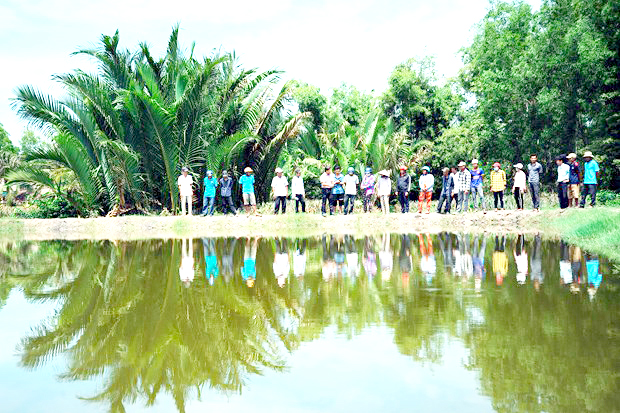 Society
Society

A model that rotates rice cultivation with shrimp breeding in the same field has become very popular in the Cửu Long (Mekong) Delta since it helps adapt to climate change, experts have said.

|
| Farmers learn the rice-shrimp farming techniques in Kiên Giang Province’s Vĩnh Thuận District. — VNA/VNS Photo An Hiếu |
BẠC LIÊU — A model that rotates rice cultivation with shrimp breeding in the same field has become very popular in the Cửu Long (Mekong) Delta since it helps adapt to climate change, experts have said.
The model is efficient, reduces disease risks and is environment-friendly since farmers use few chemicals.
The shrimp eat natural food available in the field, and so farmers do not need to spend money on it. The field is fertilised by shrimp waste and so farmers do not need to spend much money to fertilise it.
Both the rice and shrimp produced under the model are clean.
It also helps prevent the spread of disease and rice pests.
Speaking at a forum held in Bạc Liêu Province on Monday (October 5), Trần Đình Luân, head of the Directorate of Fisheries, said rice-shrimp farming is a particularly identified farming model in the delta’s coastal provinces where saltwater intrusion normally occurs between December and May.
In the rainy season rice farmers use rainwater to wash the salt from their fields, while in the dry season, they are turned into shrimp farming fields, he said.
The delta’s rice-shrimp farming fields expanded from 71,000ha in 2000 to 185,000ha in 2018, or 30.8 per cent of the total shrimp farming area.
Farmers can earn VNĐ60-70 million (US$2,580-3,000) per hectare per year.
The delta’s coastal provinces of Kiên Giang, Cà Mau and Bạc Liêu account for the largest rice-shrimp farming areas.
But the model faces problems like small scale and scattered areas, traditional farming methods, lack of investment, and failure by many farmers to adopt modern farming methods, according to participants in the forum.
Shrimp diseases, rice pests, drought, and saltwater intrusion have meant the average income from the model is low and does not meet the delta’s potential.
The delta lacks investment in shrimp breeding and improving the quality of shrimp seed while rice cultivation depends mostly on rains.
The Government, relevant ministries and delta provinces should have suitable policies for producing organic rice and shrimp, according to participants at the forum.
Dương Thành Trung, chairman of the Bạc Liêu People’s Committee, said: “With the delta’s current rice-shrimp farming area, we have conditions to build brand names for rice and shrimp farmed under the model.
“When we have brand names and large quantities of rice and shrimp, we can control the market.”
The farming of both rice and shrimp helps farmers increase their incomes, he said.
Besides, the model seeks to develop fragrant rice and clean shrimp, and organic rice and shrimp, he said.
The delta’s new fragrant rice varieties like ST 24 and ST 25, which rank among the world’s best, are now being grown under the model.
ST 25 ranked first in the World’s Best Rice Contest last year and ST 24 ranked third in 2017.
The delta’s shrimp-rice farming area is expected to increase to more than 211,900ha this year, and shrimp output to 84,700 tonnes. — VNS




